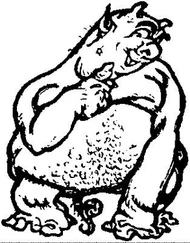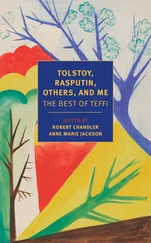•
The day comes. Our train is leaving this morning.
Since the night before, Gooskin has been rushing from me to Averchenko, from Averchenko to his impresario, and from his impresario to the actresses. He keeps going into the wrong apartments and phoning the wrong numbers. At seven o’clock he bursts in on me, panting, covered in sweat, like an overheated horse. He looks at me, then spreads his hands despairingly in the air.
“Of course! Wonderful! Late for the station!”
“Surely not! What’s the time?”
“Seven o’clock, almost ten o’clock. The train leaves at ten. That’s it—it’s all over now.”
Someone gives Gooskin a lump of sugar. Gnawing on it like a parrot, he calms down a little.
A horn sounds in the street below, from the motorcar sent by our guardian angel.
It’s a wonderful autumn morning. Unforgettable. Up above—pale blue, and golden cupolas. Down on the earth—gray and heavy, and eyes glazed over in deep sorrow. Some Red Army soldiers herding along a group of prisoners. A tall old man in a beaver hat carrying a bundle wrapped in a woman’s red calico kerchief. An old lady in a soldier’s greatcoat looking at us through a turquoise lorgnette. A line by a dairy kiosk with a pair of boots displayed in the window.
“Goodbye, Moscow, dearest Moscow! It’s not for long. Just a month. I’ll be back in a month. In one month. And then… No, best not to think.”
“When you’re walking a tightrope,” an acrobat once told me, “you must never imagine that you might fall. On the contrary. You have to believe that everything will work out—and you must hum some little song to yourself.”
A jolly little tune from Silva is going round and round in my head. The words are stunningly inane:
Cupid can’t be canned,
Cupid can’t be kind.
Stupid Cupid turns a man
Blinder than blind.
What goose could have composed a jingle like this?
Gooskin is waiting outside the main entrance to the station, along with the commissar whose heart had awoken.
“Moscow, dearest Moscow, farewell! See you in a month!”
•
That was ten years ago.
OUR JOURNEY got off to a fairly smooth start.
We were in a second-class train car, each with a seat of our own. We were sitting the way passengers are generally meant to sit—no one was curled up underneath the seats or lying up above in the luggage rack.
My impresario, the pseudonymous Gooskin, became very agitated: Why was the train taking so long to leave? And then, when it finally did leave, he said it was ahead of schedule.
“And that’s a bad omen. Goodness knows what will happen now!”
The moment Gooskin climbed into the train car, his appearance changed bizarrely. Anyone would have thought he had been traveling for ten days—and in the most appalling conditions. His shoes were unlaced, his collar unbuttoned, and there was a round green spot beneath his Adam’s apple—evidently from a copper stud. Strangest of all, his cheeks were covered in stubble—as if he had been three or four days without shaving.
Along with our own group, there were three other ladies in the compartment. They were talking very quietly, sometimes even in a whisper, about matters all too close to our immediate concerns: who had managed to smuggle their money and diamonds abroad, and how.
“Have you heard? The Prokins managed to get away with their entire fortune. They used their old grandmother as a mule.”
“But how come the grandmother didn’t get searched?”
“How can you ask? She’s so unpleasant. Who would dare?”
“As for the Korkins, they were really smart. And all on the spur of the moment! Madame Korkina, who’d already been searched, was standing to one side. And then, all of a sudden—‘Ow! Ow!’—she twists her ankle. She can’t walk, she can’t even take a single step. Her husband, who hasn’t been searched yet, says to a Red Army soldier, ‘Please pass her my stick. She needs it.’ The soldier gives her the stick. And it’s the stick they’ve hollowed out and stuffed with diamonds. How do you like that?”
“The Bulkins have a teapot with a false bottom.”
“Fanichka took a huge diamond out of the country—you’ll never believe this—by stuffing it up her own nose.”
“All very well for her—she’s got a fifty-carat nose. But we aren’t all as lucky as her.”
Then they told the tragic tale of how a certain Madame Fook cleverly hid a diamond in an egg. She made a small hole in the shell of a raw egg, put the diamond inside, and then hard-boiled the egg: Who could find her diamond now? So she puts the egg into her food basket and sits there calm as can be, smiling away. Along come some Red Army soldiers. They search the luggage. And then one of them grabs that very egg, peels it and wolfs it down before Madame Fook’s very eyes. The poor woman traveled no further. She got off at that station and trailed around after that wretched Red Army soldier for three days on end, not once letting him out of her sight, as if he were a little child.
“And then?”
“What do you think? Nothing! She went back home empty-handed.”
Then they started talking about all sorts of cunning ploys—things they did to trap spies during the war.
“They grew so crafty, those spies! Just imagine: They started drawing plans of fortresses on their backs and then coloring them over. Well, military intelligence aren’t stupid either, they caught on to this pretty quick. They started washing the backs of any suspicious characters. Of course, there were unfortunate errors. Back home in Grodno they caught this gentleman—he was dark-haired and suspicious as they come, but after a good wash he turned out to be the most honest of blondes. Military intelligence was most apologetic…”
Peaceful discussion of these alarming topics made our journey both entertaining and informative, but we hadn’t even been going three hours when the train stopped and everyone was ordered to disembark.
•
We get off the train, drag our luggage out, stand on the platform for about two hours, and then get onto a different train. This train is third class only and packed full. Some malicious-looking peasant women with pale eyes are sitting opposite us. They clearly don’t like the look of us.
“Here they be on our train,” says a woman with a pockmarked face and a wart. “Here they be on our train, but where and why they’re going, they haven’t a clue.”
“Like dogs off a chain,” agrees the other one. She has a grimy headscarf and is using the corners of it, rather gracefully, to wipe her duck-like nose.
What irritates them most of all is a Pekinese dog—a tiny, silken ball lying on the lap of the older of our two actresses.
“A dog on a train! Look at her—a hat on her head and here she be on a train with a dog!”
“Should’ve left it at home. Nowhere for folks to sit and here she be with this hound of hers!”
“But she’s not in your way,” says the actress, her voice quivering as she defends her hound. “Anyway, it’s not as though you’d be sitting here on my lap!”
“No, we’d not be travelin’ around with dogs,” the women continue relentlessly.
“I can’t leave her at home on her own. She’s delicate. She needs more care than a little child.”
“Huh?”
“What d’ye mean by that then?” shouts the pockmarked one, leaping to her feet in fury. “Here, listen to this! This one here with the hat says our children’s worse than dogs! We’re not standing for this, are we?”
“Huh? Us? We be dogs and she ain’t?”
Then this discussion—and there’s no knowing where it might have led—is interrupted by a wild shriek. The shriek comes from the space at the end of the train car. Everyone jumps up and rushes to investigate. The pockmarked woman goes as well, and, when she returns, she tells us in the most amiable of tones that a thief had been caught and that they’d been about to “drop ’im under the car”—only the thief had beaten them to it. He’d jumped off the moving train.
Читать дальше












